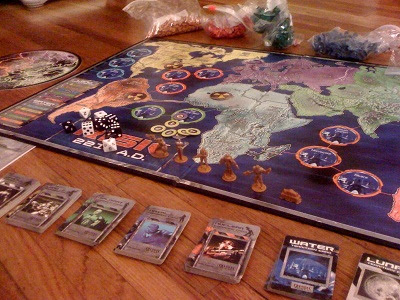A game that I finally pulled back out of my closet to give it another shot was Axis & Allies Pacific
In Axis and Allies Pacific, each of the players is taking on the role of a super power in the Pacific Theater during World War II (and if you are playing 2-player, then one person takes on both the United States and the United Kingdom). From here, the Japanese player is attempting to financially outlast the rest of the world, whereas the Allied powers are attempting to either capture Japan or make them financially irrelevant by taking (almost) all of the countries that they control. If you have played Axis and Allies in any version before, you will be very familiar with the mechanics of Pacific, but there will still be a few things like Kamikaze attacks, Naval and Air bases, and the new victory conditions that you will need to become familiar with.
One of the biggest pros with Pacific along with all Axis and Allies games is that they have a good unit and purchasing system. There are different units, each of which has it's own movement, attack rating and defense rating, but the different units cost different amounts of money "IPC's". You earn IPC's at the end of each turn based on which countries you control and throughout the game this amount will fluctuate based on what you have successfully invaded and what has been taken over from other hostile powers. I believe that Axis and Allies invented this system a long time ago, and it has been used in all of their boardgames since because, frankly, it works very well.
The next thing that I like about Pacific is that it gives you a change of pace from the normal Axis and Allies. If you are a true fan of Axis and Allies (and if you're not, why would you be playing it anyway?) then you will probably get tired of playing the normal scenario. Pacific allows you to focus on elements of the game that are sometimes less consequential in the original version of the game like naval combat. In Pacific, if you do not focus on the naval aspect of the game then you can expect to be completely slaughtered - you are unable to move any of your units around or get any strategic positioning without naval combat in this version of the game. In addition, the change in victory conditions in Pacific also forces the players to think through their strategies a little more, and the game seems weighted well for the new victory conditions. (Whereas Japan starts with a large number of units and only has to "survive" a certain amount of time in the game in order to win, the Allied powers, specifically the United States start with economies that are more than triple that of Japan.)
A final pro that Pacific introduced was the ability to blockade trade routes. Since all of the islands are only useful if trade can get to them, Pacific focused on this feature. To do this, the game established some water spaces that are on "convoy" routes - if the Japanese player can take these water spaces from the Allies, then they can deprive them of IPC's, even though it doesn't gain any for the Japanese player. There are also islands that are part of trade routes and so, if the Japanese player is able to block the water around the island then it prevents anyone from gaining IPC's from the territory. If the Japanese player can take the island as well, then they are also able to gain these IPC's.
Though there are a lot of very positive aspects of Pacific, there are a few drawbacks. First, all of the drawbacks of the original Axis and Allies are still present - setup time, length of time to play, and dice rolling. Briefly, the game takes quite a while to setup. It also takes several hours to play (which is a pro or con depending on who you ask). Finally, all of the battles are determined by rolling dice. If you are able to roll dice very well and your opponent is not, then you will have a significant advantage beyond what any strategy can give.
The next con (this one unique to Pacific) is that you can wind up spending a lot of time fighting over territories that don't matter. Whereas in the original Axis and Allies each territory was worth something, even if it was just one IPC, in Pacific there are lots of territories (most of China and tons of the islands) that are worth absolutely nothing. None of the territories I'm referring to are worth IPC's, but a lot of the islands aren't even useful for bases (naval or air) - they are just places that you can land troops. If you can cut off all of the transports to that island, it doesn't even matter who controls the island itself.
Overall, Axis and Allies: Pacific receives a 7.5/10. I kicked this number around for a while and if you ask me in 30 minutes it may be an 8.0 instead, but I think that it is just a touch worse than the original Axis and Allies (and also less innovative - I give credit for innovation). If you are a fan of Axis and Allies and looking for a way to play it a little differently, or really enjoy the naval combat part of World War II, then you should definitely look into the game. If you are new at the Axis and Allies system, however, I would recommend trying the original Axis And Allies
If you like war games, you should definitely check out Risk: Legacy, Risk 2210 AD, and Test of Fire: Bull Run 1861.




